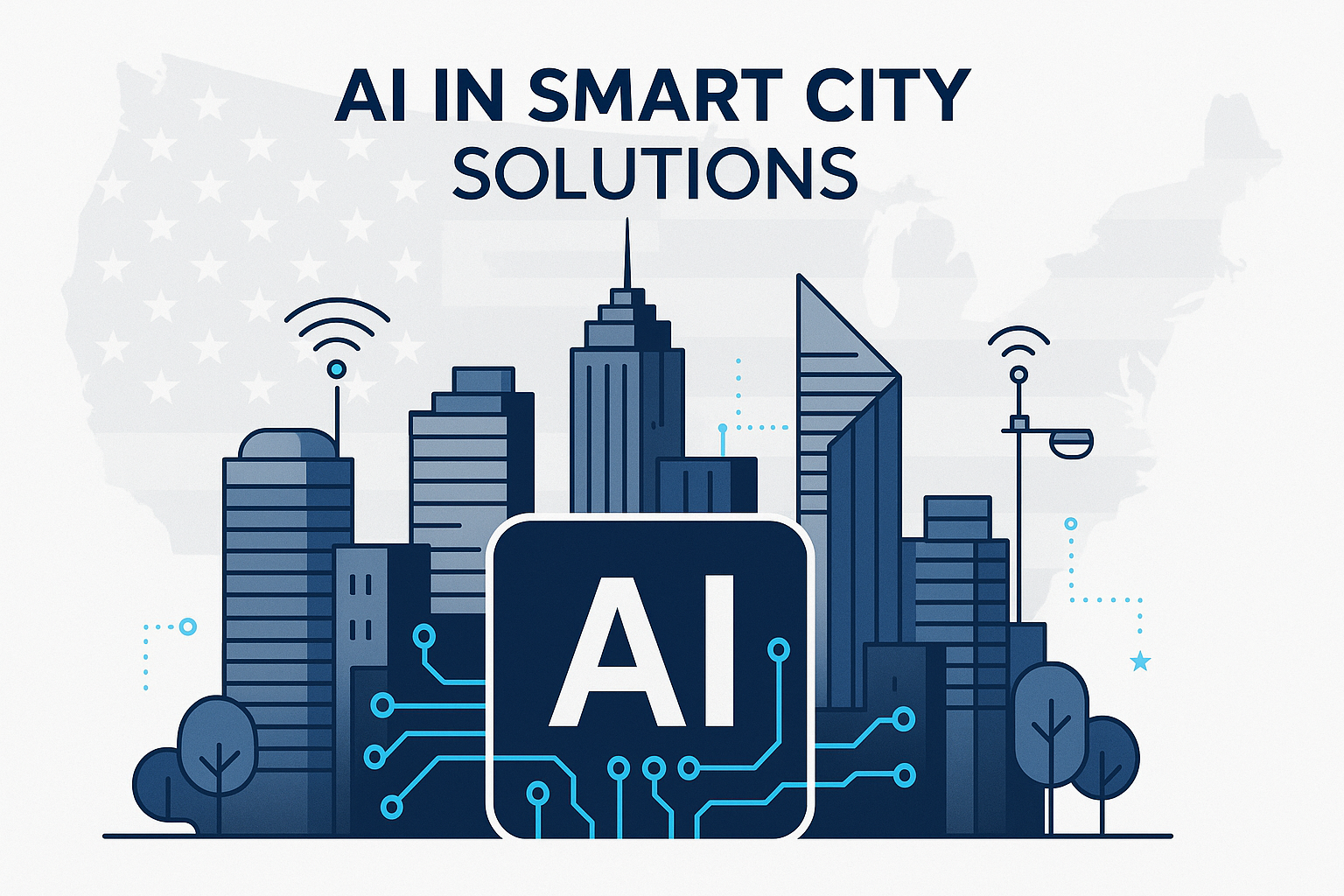
AI in Smart City Solutions: Transforming Urban Living in 2025
Artificial Intelligence (AI) is revolutionizing the way cities operate, making them smarter, safer, and more sustainable. As we move into 2025, AI in smart city solutions is at the forefront of urban innovation across the United States. This comprehensive guide explores how AI is powering smart city initiatives, the top applications, benefits, and challenges, and what the future holds for AI-driven urban environments.
Understanding AI in Smart City Solutions
Smart cities leverage digital technology to enhance the quality of life for residents, improve efficiency, and promote sustainability. AI acts as the brain behind these solutions, enabling real-time data analysis, automation, and intelligent decision-making across various city functions.
What Is a Smart City?
A smart city uses interconnected devices, sensors, and data analytics to optimize services such as transportation, energy, public safety, and waste management. AI amplifies these capabilities by:
- Automating complex processes
- Predicting trends and issues
- Enhancing citizen engagement
- Reducing operational costs
TIP: In 2025, over 80% of major U.S. cities have adopted at least one AI-powered smart city solution, according to the latest urban technology surveys.
Top 10 AI Applications in Smart City Solutions (2025)
AI is driving innovation across multiple urban sectors. Here are the top 10 AI-powered smart city applications transforming U.S. cities in 2025:
- AI Traffic Management Systems
- Smart Public Safety & Surveillance
- Intelligent Waste Management
- AI-Driven Energy Optimization
- Predictive Maintenance for Infrastructure
- Smart Water Management
- AI-Powered Public Transportation
- Urban Air Quality Monitoring
- Digital Citizen Services
- AI-Enabled Emergency Response
Side-by-Side Comparison Table
| Rank | AI Application | Key Benefit | Example Use Case |
|---|---|---|---|
| 1 | AI Traffic Management | Reduces congestion | Adaptive traffic lights |
| 2 | Smart Public Safety | Enhances security | Real-time crime detection |
| 3 | Intelligent Waste Management | Cuts costs, boosts recycling | Route optimization for trucks |
| 4 | Energy Optimization | Lowers energy bills | Smart grid management |
| 5 | Predictive Maintenance | Prevents breakdowns | Bridge and road monitoring |
| 6 | Smart Water Management | Saves water, prevents leaks | Leak detection sensors |
| 7 | Public Transportation | Improves reliability | AI-based scheduling |
| 8 | Air Quality Monitoring | Protects public health | Pollution prediction |
| 9 | Digital Citizen Services | Streamlines interactions | AI chatbots for city services |
| 10 | Emergency Response | Faster, smarter responses | AI-driven dispatch systems |
How AI Enhances Smart City Operations
AI Traffic Management: Smoother Commutes 🚦
AI-powered traffic systems analyze real-time data from cameras and sensors to optimize signal timings, reroute vehicles, and reduce congestion. In cities like Los Angeles and New York, these systems have cut average commute times by up to 20% in 2025.
Smart Public Safety: Safer Communities 🏥
AI-driven surveillance and analytics help law enforcement detect suspicious activities, predict crime hotspots, and respond faster to emergencies. Facial recognition and gunshot detection systems are now standard in many U.S. urban centers.
Intelligent Waste Management: Cleaner Cities 📦
AI optimizes waste collection routes, predicts bin fill levels, and encourages recycling through smart incentives. This reduces operational costs and environmental impact.
AI-Driven Energy Optimization: Sustainable Urban Living 🌱
Smart grids use AI to balance energy supply and demand, integrate renewable sources, and detect outages before they occur. U.S. cities have reported up to 15% reductions in energy consumption thanks to these solutions.
Predictive Maintenance: Infrastructure Reliability 🏗️
AI monitors bridges, roads, and public buildings for signs of wear or damage, enabling proactive repairs and reducing costly breakdowns.
Benefits of AI in Smart City Solutions
- Efficiency: Automates routine tasks and optimizes resource allocation.
- Cost Savings: Reduces operational expenses for city governments.
- Sustainability: Promotes greener practices and reduces waste.
- Safety: Enhances emergency response and public security.
- Citizen Engagement: Improves access to services and information.
TIP: Cities that invest in AI-driven smart solutions report higher resident satisfaction and improved economic competitiveness.
Challenges and Considerations for AI in Smart Cities
While the benefits are significant, implementing AI in smart city solutions comes with challenges:
- Data Privacy: Ensuring resident data is protected and used ethically.
- Integration: Connecting legacy systems with new AI technologies.
- Equity: Guaranteeing all communities benefit from smart city advancements.
- Cybersecurity: Protecting critical infrastructure from digital threats.
- Funding: Securing investment for large-scale AI projects.
TIP: Successful smart cities prioritize transparent governance and community involvement when deploying AI solutions.
The Future of AI in Smart City Solutions (2025 and Beyond)
The next wave of AI in smart city solutions will focus on:
- Personalized Urban Services: Tailoring services to individual needs using AI-driven insights.
- Autonomous Mobility: Integrating self-driving vehicles and drones for transport and deliveries.
- Climate Resilience: Using AI to predict and mitigate the impacts of extreme weather events.
- Digital Twins: Creating virtual models of entire cities for real-time simulation and planning.
As AI technology advances, expect even smarter, more responsive, and more inclusive urban environments across the United States.
Conclusion: AI in Smart City Solutions Is Shaping the Urban Future
AI in smart city solutions is no longer a futuristic concept—it’s a present-day reality transforming how U.S. cities operate in 2025. From traffic management and public safety to energy optimization and citizen engagement, AI is driving efficiency, sustainability, and improved quality of life for millions of Americans.
While challenges such as data privacy, integration, and equity remain, forward-thinking city leaders are embracing AI to build smarter, safer, and more resilient communities. As technology continues to evolve, AI will play an even greater role in shaping the cities of tomorrow, making urban living more connected, convenient, and sustainable than ever before.
Embracing AI in smart city solutions is not just an option—it’s the key to unlocking the full potential of America’s urban future. ✅